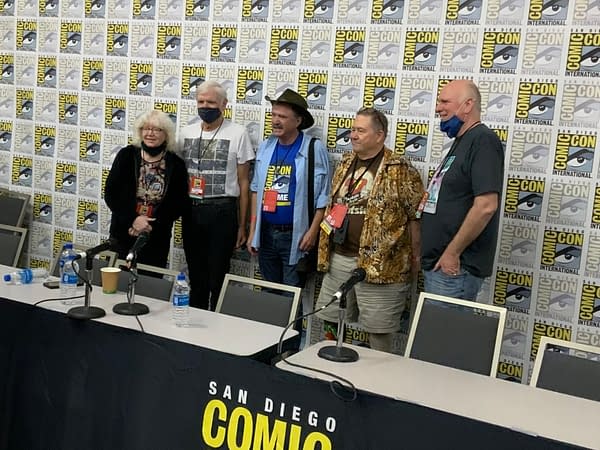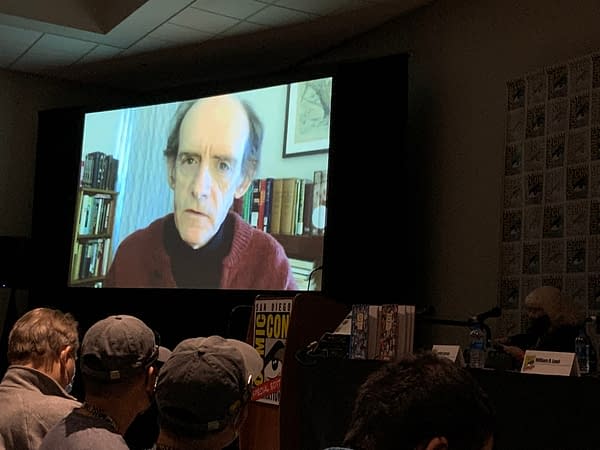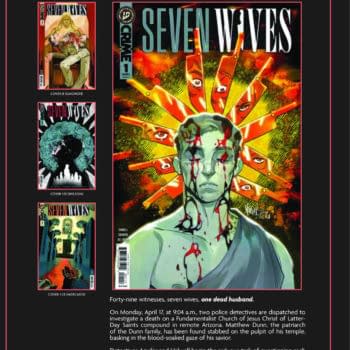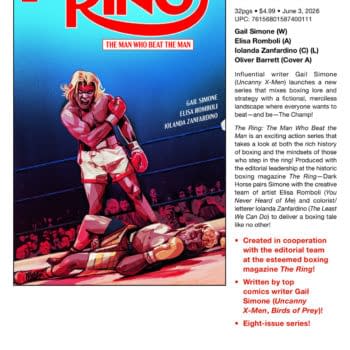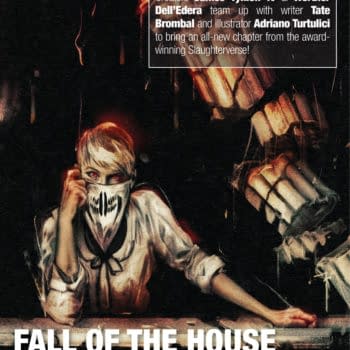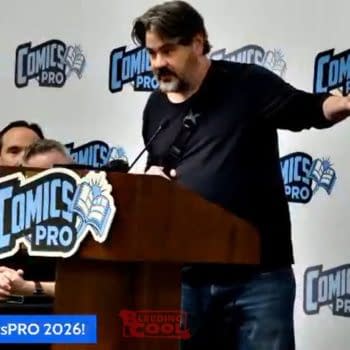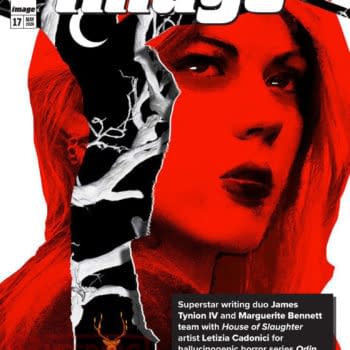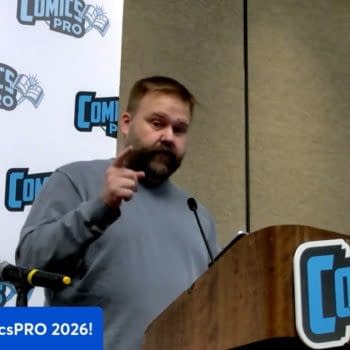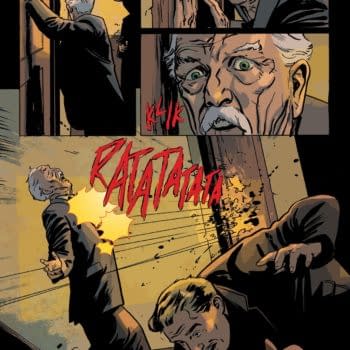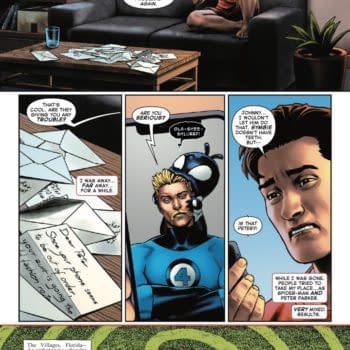Posted in: Comics | Tagged: san diego comic con, sdcc
No One Told Us We Couldn't – The Founders Of San Diego Comic-Con
One of the most packed-out panels at the San Diego Comic-Con: Special Edition 2021 this weekend was a bit of a meta-panel, featuring the surviving founders of San Diego Comic-Con from over fifty years ago, with William R Lund, Dave Clark, Scott Shaw!, Mike Towry – and after seeing Jackie Estrada waving at me from two of my panels over the weekend, it was a pleasure to return the favour.
Jackie Estrada talked about how she and her then-boyfriend, used to buy every single comic book published at the time from Harris Street News in San Diego. That she went to the first show for the day, and has been to every single San Diego Comic-Con since, one of only five people who have. She started volunteering at the show, they found out she did PR, and she became the show's official photographer. In 1990 became the administrator of the Eisner Awards. And while not a founder per se, she was on the panel to help guide certain founders towards clarity and brevity.
Barry Alfonso, one of original founders, videoed into the panel. He talked about meeting the late Shel Dorf who had put on the earliest comic-cons, when he was a young comic book fan, introduced him to the late Richard Alf, comic book store owner, who invited fans to be part of a group that would become the San Diego Comic-Con. Jackie talked about how there were many threads and many groups that came together to create the show, from individuals, societies, and groups. And we got to hear about a few of them.
Cartoonist Scott Shaw! was a high school student with Dave Clark also on the panel and together formed an underground film society to talk about comics, with twenty kids at the school, many of whom went on to be authors of books and comics, including professors, researchers and one of the original creators of the Garbage Pail Kids. But Scott was the school cartoonist, and Dave replaced him after Scott graduated.
Scott talked about how, at the time, bookstores and cinemas propped up their profits with pornography and that the late Ken Krueger had such a bookstore and a business brain. That he acted as an uncle to these kids with comic convention plans and that Scott dated his daughter. He also published the comic Gory Stories with Scott and John Rogers work inside and did cartoons with Dave.
Ken introduced them both to Shel Dorf, who had moved to San Diego in 1969, with the intent to create a convention based on comics, sci-fi, and film. Dave talked about how this was a combination of Shel's vision but Ken's practical real-world contribution. And the late Richard Letson's money. Letson was already selling and dealing comic books, was younger than Dave – although he gave Dave his first job, selling comic books.
Mike Towry talked about how, in 1969, Richard Lester and Bob Sourk were comics dealers at another school, and that Richard met Shel in order to see the comics Shel owned. Shel told him about his Triple Fanfare show in Detroit, with the late Jerry Bails, as a multi-media convention.
With lots of talking and discussion between these groups, and with parents driving them around San Diego, Mike says they weren't convinced by Shel Dorf after all, he was pretty old, he was 36. But he called up Jack Kirby and invited the kids to his home. And Barry, then twelve, was immortalised by Jack Kirby in comics as the sixth member of the San Diego Five String Mob in Jimmy Olsen, and as Klarion The Witch-Boy in 1973.
Mike Towry managed to get articles in local newspapers, looking for a home for a proposed Comic-Con. Shel Dorf contacted the San Diego tourist board, and got an introduction with the US Grand Hotel which had fallen on hard times, and gave them the basement for free for one day in March, if they paid for three full days later in August. The hotel apparently was worried about the low bar tab because the organisers and expected attendees were all kids.
Dave mentioned that the reason it wasn't called San Diego Comic-Con for the first few years was that he didn't think people knew where San Diego actually was, but knew the nickname of the state. But when the Republican Party held their conference in San Diego in 1972, they had to find somewhere else as all hotels were booked up – but not El Cortez, where they stayed for years,
We also learned how Ray Bradbury was acquired as a guest for the early shows, even though he asked for either $3,000 or $5,000 appearance fees (there is division as to which). Either way, it was well outside their budget, Shel Dorf on the spot told Ray that the show would be non-profit and was there to educate the public, and Ray Bradbury said that, in that case, he would come for free. And that is the origin or the show being non-profit – although that would only become official a few years later as for the first few shows, they all lost money. And Jackie Estrada reminded us that Jack Kirby and Ray Bradbury became part and parcel of the show, hardly missing any appearances until their deaths.
As for the location of San Diego? Scott Shaw said that "we never realised that San Diego was the most desirable place in America to have a vacation. We didn't realise most of the cartoonists were in NY. So they could tax deduct their vacation with their family to San Diego". And that this factor accelerated interest from East Coast comic book publishers, especially when Neal Adams proselytised the show to Marvel and DC.
Dave Clark stated that "as Comic-Con gets bigger and bigger, I am tremendously moved that something we started that taken on a life like this and brought such benefit to my home town a city that I love." While Mike Towry puts the success of the show down to the entrepreneurship and dedication of the original founders and that "Nobody told us we couldn't."
There was also an emotional appearance at the panel by David Seigel, who specialised in tracking down Golden Age comic book creators, and arranging to bring them to San Diego Comic-Con, people who had not gotten attention for their work during their careers, but could come to Comic-Con to meet their fans for the first time.
There will be an upcoming Comic-Con Museum exhibit about the show and its origins, the 40th Anniversary book is on sale and Fantagraphics has an Origins Of Comic-Con book soon to be published. And it ended with an attendance raffle…


